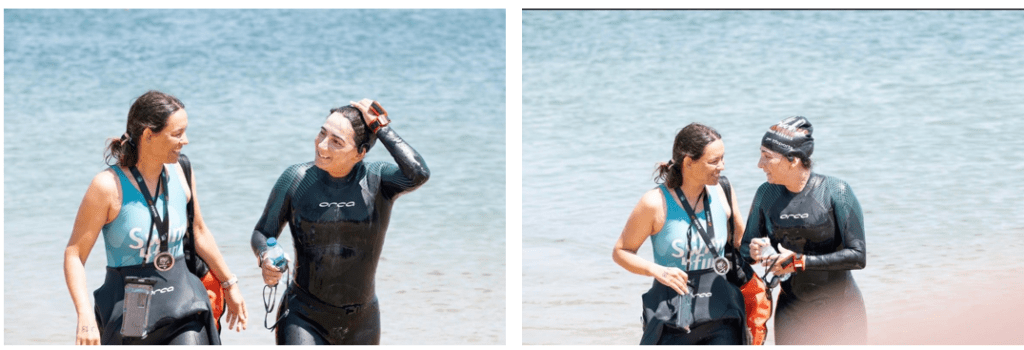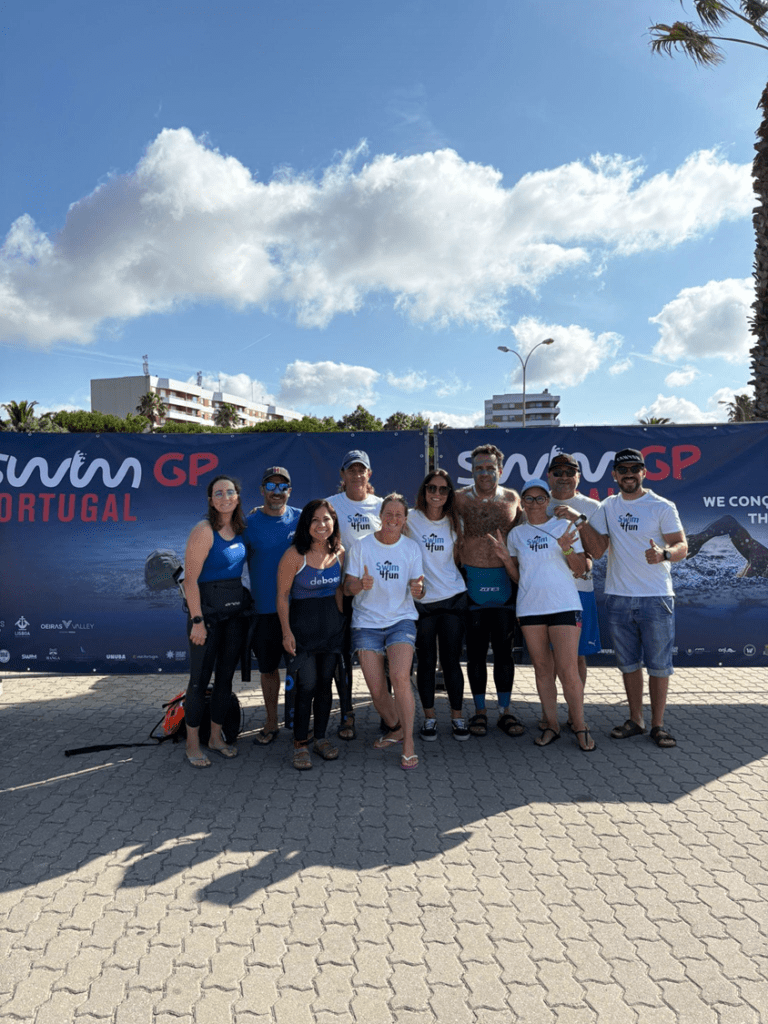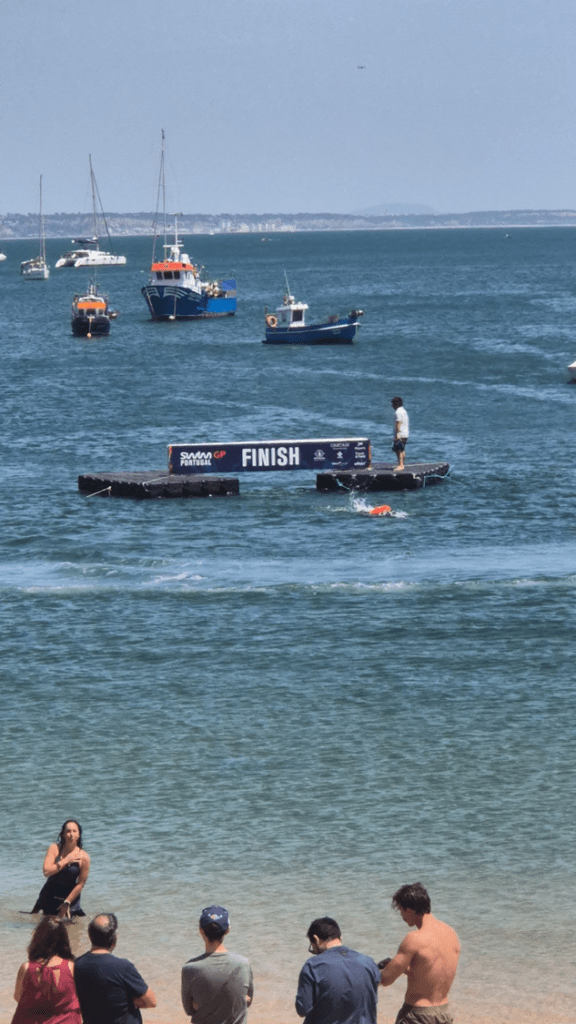
After being scheduled for a second ankle surgery within 7 months, about 20 days before the race, I was forced to withdraw from participating in the SwimGP 10 km. I was only authorized to return to the water 10 days before the race, which was insufficient to train for an event of this magnitude
Three days before the event, during an open water training session, Bibiana challenged me to take part anyway, without pressure, and to see the crossing as preparation for the Faial-Pico. And so I went.
I arrived very early that day, spent some time alone looking at the sea and, unlike the previous year, without fog, the sea seemed relatively calm. Gradually, my fellow ‘professionals’ began to arrive. We were all a little nervous, which is normal given the challenge that awaited us. As usual, I gave Mayra a supportive hug (probably more than one).
Anxious, but without pressure to finish, I started the race. In the first meters I came across a swimmer without a wetsuit, keeping a calm pace, and I thought: at this pace I’m comfortable, I’ll stay here. But as I approached Carcavelos beach, I saw a group ahead and noticed that one of the buoys was perfectly stretched and tidy – I immediately recognized it was Mayra. I gave an extra kick, and after a few minutes, I was in a comfortable place: right behind Mayra, catching her draft.
I wasn’t the only one with that idea. I had to fight for the spot with some colleagues, because following in Mayra’s wake is truly a privilege. We were in a large group, but with the usual contact I managed to secure that this would be my place
In Carcavelos, I realized from the pace and from the fact that we hadn’t moved on for more than an hour that the current and the wind were against us. The sea was rough, but still bearable. There was hope that conditions would improve with each beach – but that never happened.
At the first feed we stayed with the group, but at the second, already near the 5 km mark, it was just the two of us. I felt full of energy (later I realized it was just the battery running out) and I went ahead for a few meters, maybe 1 km. Then we switched and I followed in Mayra’s wake again, but I broke around the 7 km mark and could no longer keep up. By then we had already been swimming for over 3 hours.
At the fixed feed station at 7.5 km, Mayra was waiting for me and helped me to take in some nutrition – already sick of gels, but aware of their importance, I made the effort. We also came across André Marquet, who continued on his journey. Until then I thought we were at 6.5 km, but I received the happy news that only 2.5 km were left and that, theoretically, it would become easier, as we would start to be more sheltered.
We carried on, but after 100 m I realized I could no longer keep up with Mayra’s pace. My arms hurt intensely and, despite the gels, isotonic drinks, and water, I felt empty.
Until then I had never considered giving up, and when the thought came, I immediately rejected it. With 2 km to go in a 10 km race, quitting would be something very hard to overcome mentally. The race, which at the start had no pressure to finish, took a turn at 8 km.
“I alternated kicking with full strokes until I spotted Graham, who asked me if I was okay. I swam beside him for a few meters and then managed to pick up a bit more pace, completing the last 700 m in slow full strokes, in a kind of meditation. Psychologically, it was tough to see so many swimmers overtaking me without being able to keep up, but I was even more determined to finish than to let it affect me.

It wasn’t a thoughtless decision: I knew I had the energy to finish, but I could only access it through mental persistence, because my body was screaming NO. Of course, imagining myself quitting at 9 km gave me even more strength to keep going – pride
In the last 200 m, already passing by the boats, the first swimmers of the 20 km race were finishing. I touched the finish line and started dragging myself toward the beach… until I heard Mayra shouting from the sand: LET’S GO! I found a bit more energy so she wouldn’t have to wait 10 minutes for me to cover 20 meters. I understood the hurry – we had been in this ‘game’ for almost 5 hours.
Only after a few hours did I truly realize what I had accomplished: in adverse conditions, without proper training or preparation, I achieved the goal.
Mas não sem consequências, o meu corpo e mente ficaram exaustos de tal forma que sentia-me doente – como se tivesse passado por um trauma, felizmente só durou cerca de 24h. Apercebi-me que o treino aqui também tem impacto, o treino é essencial até depois da prova.
None of this would have happened without Bibiana’s push, challenge, and belief in me, without the companionship of Mayra and all the swimmers I passed and spoke with during the 10 km. The open water community is something incredible, and I am proud to be part of it.
“I’m usually quite hard on myself: I think I should train more, that I could give more in races, that my technique is a disaster… But then I remember that I only learned to swim four years ago and that I do this as a hobby. I’ve learned that it’s important to celebrate and take pride in our achievements, big or small, because they are part of the journey. What matters is to never stop believing and to keep persisting to overcome obstacles — in swimming and in life.

Joana Paz – 4H48mint


Que inspiração!